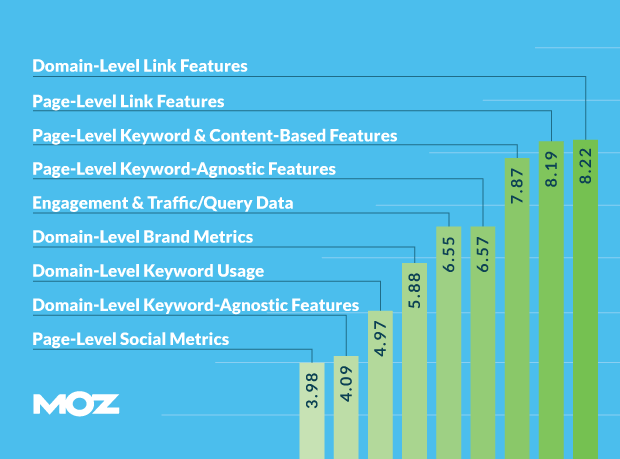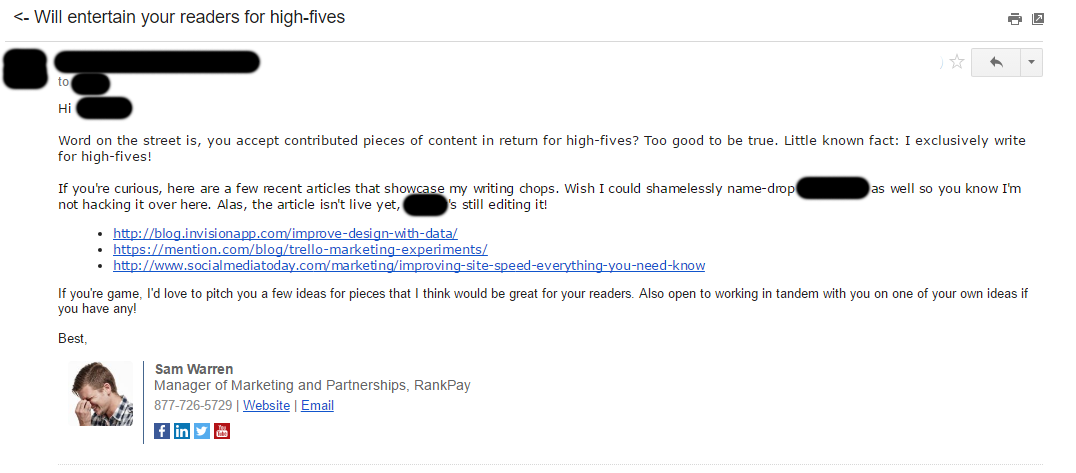While the digital marketing landscape has continually evolved over the past few years, the practice of guest posting remains a singularly effective way of growing your website’s visibility, traffic, and domain authority.
Of course, that doesn’t mean you want to just dive in and start writing for anyone that’s willing to publish you. Success is dependent on picking the right publications, forging positive relationships, and of course creating relevant and useful content!
We’ve been employing guest posting for as long as we can remember, both internally, and often on behalf of our clients. So we decided we’d consolidate all of our learnings into a guide for your benefit.
Without further ado, here’s our complete guide to how you can leverage guest posting for your own business or budding agency.
Why Guest Post In The First Place?
In short, when done correctly, it can have a powerful effect on your search presence. Plain and simple.
Take our own business as an example. In an effort to grow our own audience and earn high-quality placements, we’ve doubled down on our contributions to other publications in recent years.
This has been a powerful asset, and continues to deliver improved rankings and engagement.
Truth be told, It’s really a case of practicing what we preach.
With the data and feedback we’ve received in just 12 short months, we can safely say that data corroborates what we already knew to be true…
Blogging, and specifically guest posting, definitively moves the needle.
Next up, let’s cover why that’s the still the case.
External Links are Still Critically Important
Link building has gotten a bad rap over the past decade, and that’s because it’s been largely abused by unscrupulous players, and bad apples tend to ruin it for the bunch.
Just take a look at what you’ll see on Fiverr if you type in “link-building”. Yikes. 1,000 spam links for $10. Count me out.
Or course, established and reputable digital agencies never take this approach anymore. After all, we’re pretty darn far removed from the days when PBNs were a thing.
These days, SEO agencies focus on earning quality links, naturally and without money trading hands.
If you’re like me, sometimes seeing numbers helps. Look no further than Moz’s ranking factor report. Every two years they run the numbers and a survey, and each time external links claim the top spot as the most important factors determining a page’s rankings in Google.

Image courtesy: Moz
So let’s be direct, any website’s link porftolio is still going to be a huge factor when it comes to how well they showcase in the SERPs. The focus just needs to be increasingly on building strong and relevant links.
Make no mistake, if you cut a bunch of corners, Google will unfriend you. But earning natural links is an extremely effective way to improve your position in the SERP results.
The most common way to do this? Blogging. To be more specific, the oft-touted tactic of guest posting.
Engaging in this practice is really a win-win. Not only will you be building relevant links, you’ll also be getting your brand and your voice in front of new readers and hopefully earning some new subscribers and/or leads.
As I mentioned earlier, we’ve used this to great effect over the past 6 months. Here are just a few of the articles I’ve written for other publishers recently.
“How to Use Data to Improve Your Design” at InvisionApp.com
- “The Rise of Voice Search and Its Impact on Search Engine Optimization” at WebsiteMagazine.com
But in order to get the ball rolling, you’ll first need to get an editor’s ear. Let’s cover how to go about doing so effectively.
The Art of “The Ask”
I’m going to grandstand for a minute, then I promise I’ll get off the soapbox.
I can’t tell you how important it is to build up the courage to just ask for things. You’ll be amazed how often you’ll find new allies, friends and opportunities.
Are you going to get rejected? Yes! Is it scary to put yourself out there? Sure, I guess!
But at the end of the day, what do you really have to lose?
This is the mentality you need to take with your approach to landing guest posting opportunities. Don’t sell yourself short and take the leap.
Just be genuine and honest, and bring something valuable to the table. Whether it’s an opportunity to collaborate on a mutually beneficial project, or just a unique “trick of the trade”, identify ahead of time what your value is to a publisher/editor and highlight it.
Further, do yourself a favor and skip the templated emails. If you must, at least write it yourself and in your own voice.
Don’t be so stuffy and formal. Experiment with weird subject lines. Go crazy! Again, what do you have to lose?
Editors get pitched day in and day out, think of it like sending in your resume. If you simply send in a bland resume through the “front door application system”, you’ve already lost.
A few things to try instead…
Mutual connections
Remember, think of this process like a job hunt. If you have a mutual connection to an editor, you know what to do. Make the ask and get the ball rolling. Don’t overthink it! LinkedIn is your friend.
Trading up
Don’t be shy about name-dropping the most recent outlets you’ve been published at. It’s instant credibility and will show you’re not just hacking it.
I’ve used this technique to great effect over the past 6 months. It works like a charm. Just be tactful and tasteful in your name-dropping. Or at least crack a joke about it at your own expense.

Stand out from the crowd
Preferably without being obnoxious, but do what you’ve gotta do. Let your freak flag fly.
I’ve successfully gotten responses from publications that would have been “out of my league” by…
- Opening the email with a joke
- Employing horribly bad puns to great effect
- Writing bizarre or witty subject lines to prove I can engage readers and attract clicks
Once you’ve earned the permission to pitch or write a draft, it’s time to get down to business.
Pro Tip: There’s no point working on the ask or your email copy if you don’t end up in an editor’s inbox. Do yourself a favor and use an email finding tool to help ensure you have the right email address before clicking send. Or if you want a deeper dive, here’s a more complete guide on how to easily find any specific publisher’s contact information.
Write Original and Entertaining Content
Well, duh.
I could prattle on for hours about how to create entertaining content . But then I’d be running the very real risk of failing to heed my own advice.
Start by assessing the goals of your current content strategy.
Do you want to land a ton of low-impact opportunities? A handful of middle-of-the-road publishers? Going after the big fish?
Your goals will determine your course of action, and I’d encourage you to keep this in mind at every step of the way.
Top Tier Outlets
If you really want to trade up to increasingly valuable outlets, spinning a new piece on a topic that’s already been beaten to death is a surefire way to stall your progress.
Instead, be original. Bring something novel to the table. Try writing from your own experiences and tell a story.
Readers love a good story, and they want to hear your thoughts and stories. This is also one of the best ways to build your own credibility as an influencer.
Middle Tier Outlets
If you’re looking to earn a handful of posts on DA 40 domains, this will give you a bit more freedom and liberty as it pertains to covering topics that may not exactly be “groundbreaking”.
You’ll still want to focus on writing something entertaining and original, but it’s not as important that you write a masterpiece. Those types of articles require exceedingly more effort, and the cost-benefit ratio diminishes as the value of the outlet decreases.
Keep it concise and remember to be actionable! Advice that someone can act on after reading is still one of the best ways to endear yourself to readers.
Lower Tier Outlets
This is where rewriting and covering “tired” topics can start to become acceptable.
It’s simply an ROI calculation. How much time can you really spend on creating a fantastic piece of content for an outlet that won’t drive as much traffic or generate much of a difference in terms of SEO results?
Scaling these opportunities as appropriate is a good way to ensure you don’t end up squandering valuable time.
Every Link Counts
I don’t want to give the impression that you should start totally phoning it in at outlets with lower DA. In fact, I’d caution you to never truly phone it in.
Every link matters. Every single link. But all links were not created equal.
So when you’re crafting your own guest posting strategy, I’d encourage you to plan for a diverse and relevant portfolio of publishing opportunities.
Last but not least (and one more time for good measure) aim high! You never know what you can achieve unless you reach out and grab for it.








